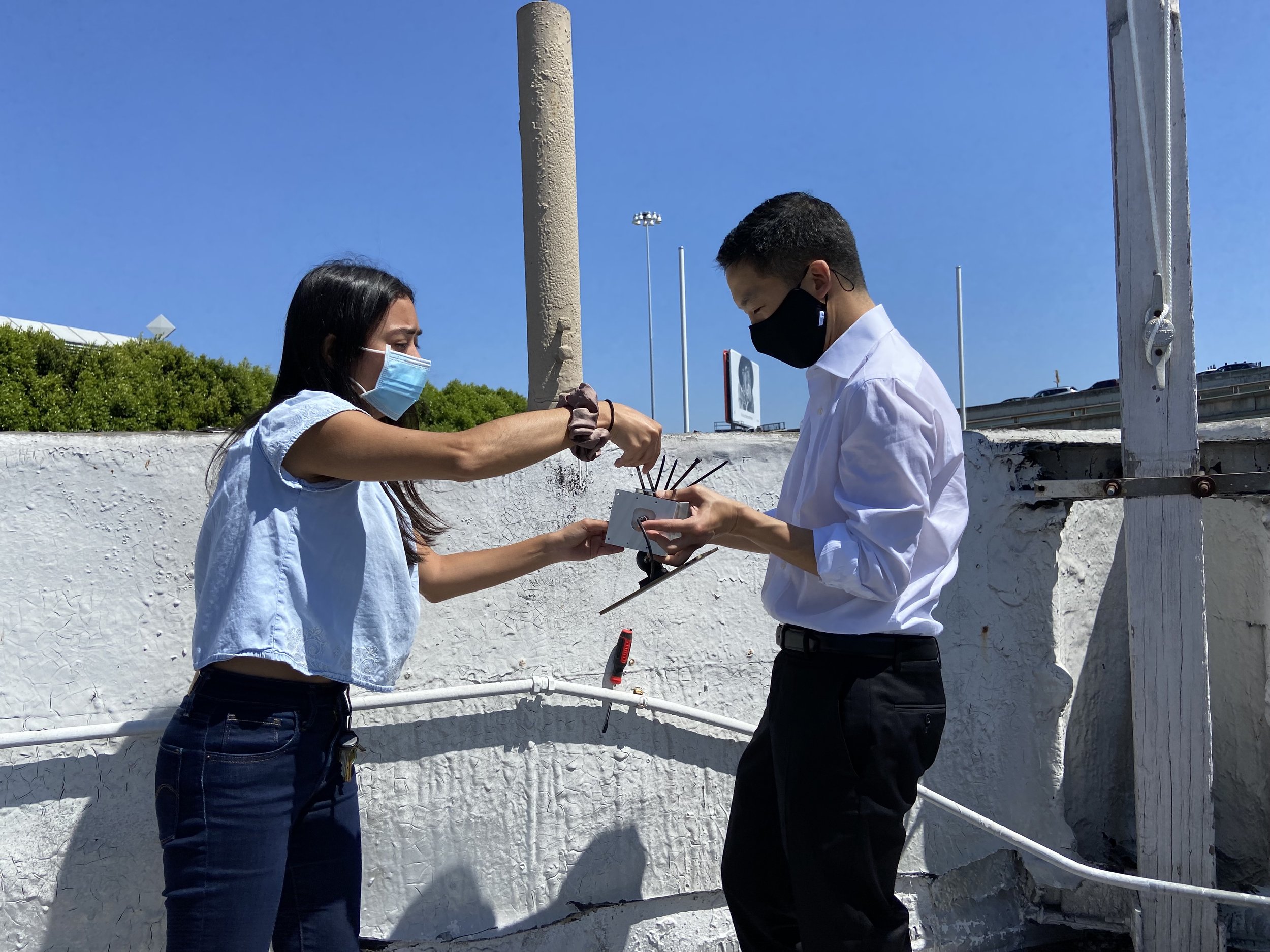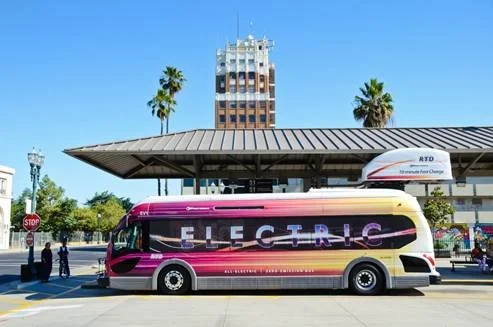In the heart of California, the San Joaquin Valley is a region where agriculture is not just an industry but a way of life for many. CARB’s Funding Agricultural Replacement Measures Emissions Reductions (FARMER) Program funds transformative initiatives that foster the adoption of innovative farming techniques, integrating advanced agricultural technologies, and promote community engagement and has been making monumental steps towards more sustainable agriculture across the valley.
San Joaquin Valley Community Air Monitoring Network Expands Access to Air Quality Data
Woodstove Replacements Heat Homes in Butte County
More than 54 Butte County households have replaced their old woodstove or stove insert with a new, cleaner alternative that heats their home, improves indoor air quality, and reduces emissions of greenhouse gases, harmful particulates, and black carbon, a particularly potent climate pollutant, thanks to vouchers provided by the Woodsmoke Reduction Program. Among the residents who have benefitted from the program are Dennis and Deb, who replaced their 1979 woodstove insert, and Riki, who replaced the woodstove that came with their farmhouse, built before 1900.
A Multi-Faceted Approach to Addressing Community-Identified Transportation Needs
The Sustainable Transportation Equity Project (STEP) is designed to increase transportation equity in disadvantaged and low-income communities by funding planning and clean transportation projects and directly engaging community residents in clean transportation solutions. STEP achieves this via two grant types: Implementation Grants and Planning and Capacity Building Grants. Paid for by Cap-and-Trade dollars, the grants ultimately will help people get where they need to go — be it the doctor’s office or daycare — without using a personal vehicle.
Demonstrating Emissions-Reducing Solutions for the Freight Sector
The San Joaquin Valley Flexible Solutions for Freight Facilities project, supported with $22.6 million in funding from the Zero-and Near Zero-Emission Freight Facilities Project along with $22.6 million in matched funds from project partners, demonstrated advanced technologies on locomotives and hybrid and zero-emission equipment around rail yards. For one part of this multi-component project, the Wabtec Corporation designed, manufactured, and commissioned a battery-electric locomotive to operate in tandem with two diesel locomotives from BNSF Railway, operating like a hybrid vehicle.
Cleaner Passenger Trains through the Capitol Corridor Rail Project
In 2019, the Capitol Corridor Joint Powers Authority, in partnership with California Department of Transportation’s Division of Mass Transit, was selected by the Bay Area Air Quality Management District to receive $7.4 million from the Community Air Protection program to help replace two diesel-powered locomotives with two new Siemens Charger Tier 4 locomotives. These locomotives are now operating on the Capitol Corridor line from Auburn-Sacramento to Silicon Valley and run through disadvantaged and low-income communities in San Francisco, Oakland, Berkeley, and more. The new locomotives achieve a 90 percent reduction in particulate matter emissions and an 80 percent reduction in oxides of nitrogen emissions compared to the old, higher-polluting locomotives.
Collecting Air Quality Data to Improve Community Health in Eastern San Francisco
Brightline Defense, an environmental justice nonprofit organization, was awarded $300,000 from the Community Air Grants program to support the Brightline Air Quality Monitoring Program. This community-driven program that will install, collect, and analyze data from 15 stationary air quality sensors in heavily populated, low-income communities throughout Eastern San Francisco. The data these sensors collect are publicly available and can be used to help shape programs and policies to create cleaner air in these communities.
Zero-Emission Forklifts Bring Air Pollution Reductions to Portside Communities
SSA Marine received $4.82 million from the Clean Off-Road Equipment Voucher Incentive Project, also known as CORE, to purchase 20 zero-emission forklifts and charging infrastructure for their locations in Stockton and West Sacramento. This equipment will help reduce greenhouse gases and air pollutants in census tracts that are heavily burdened by diesel particulate matter and other air pollutants.
Zero-Emission Truck and Bus Project Delivers Cleaner Air in San Joaquin Valley
Electric School Buses Benefit Students and Air Quality in Sacramento County
Moving Goods with Zero-Emission Technology in the Inland Empire
The Volvo Low Impact Green Heavy Transport Solutions (Volvo LIGHTS) project aims to get cleaner trucks on the road to transport goods from ports to the Inland Empire. This project includes 23 zero‑emission battery electric trucks, 29 off‑road battery electric tractors, and 58 Level 2 and direct current fast chargers.
Paving the Way for Zero-Emission Freight Facilities in Long Beach
This program will deploy 38 electric yard trucks, 9 electric gantry cranes, 18 electric heavy lift forklifts, and 15 zero-emission Class 8 trucks. The program is also including a workforce development component with curriculum being developed to support the deployment of this technology with local school districts near the three port locations, community colleges and Long Beach State University.
Woodsmoke Reduction Program Provides Efficient and Cost-Effective Heating
Wishing Tree Park Provides New Green Space in West Carson
One of the Los Angeles Neighborhood Land Trust’s most exciting parks currently under construction is the 8.5‑acre, multi‑benefit Wishing Tree Park located in unincorporated West Carson, Los Angeles County. This project has been in the works for decades, and thanks in part to a $2,500,000 grant from California Climate Investments through the Urban Greening Program the park will be opening to the public in late 2021.
Greening the Yellow Brick Road Project Transforms Street into a Symbol of Activity and Hope
With $4.1 million from California Natural Resources Agency’s Urban Greening program, this project is helping bring the community’s vision to fruition and will benefit thousands of community residents. The project will create a safe and green public space where neighbors can come together and a designated route for residents to bike and walk in a safe environment.
El Centro Free Trees Program Provides Education, Shade, and Cleaner Air
Reviving Stockton's Urban Tree Canopy
Free and Reduced Price Fares Increase Low-income Transit Ridership to Yosemite
High-Speed Rail Grade Separation in San Mateo Helps to to Alleviate Congestion
The California High-Speed Rail Authority, the city of San Mateo, and the Peninsula Corridor Joint Powers Board are creating a grade separation project at East 25th Avenue, which will raise the Caltrain tracks and slightly lower East 25th Avenue in San Mateo, reducing idling traffic and air pollution, and improving safety.






















